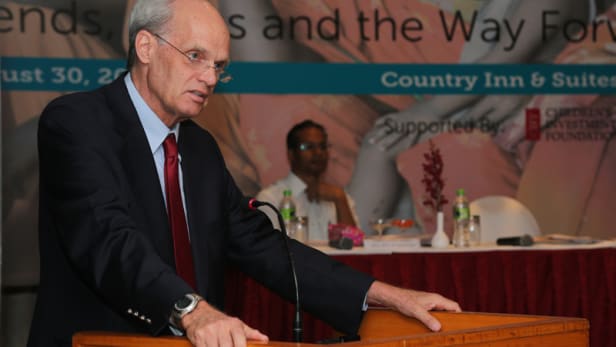By Sophie Edwards
 |
| David de Ferranti at a nutrition event in Jaipur, India, in August 2016. Photo by: Results for Development |
David de Ferranti has seen and done a lot during a long development career — he spent 25 years at the World Bank where he was regional vice president for Latin America and the Caribbean, started his own nonprofit, and also served as a fellow at the Brookings Institution and the United Nations Foundation.
After decades in the development business, de Ferranti is not retiring, although he did recently step down from his latest role as founder and chief executive of the Results for Development Institute, an organization he started nearly 10 years ago to “bridge the gap” between policy and research. In that time, R4D has grown from just a handful of employees to more than 115 staff.
Devex caught up with de Ferranti at an event to mark the end of his time as R4D’s president, where he reflected on the future of development and asked: Will the development business be out of business by 2040?
The short answer to this question, according to de Ferranti, is “no”. After all, the development community has been predicting its own extinction for years and is still very much alive, he said.
Instead, he predicts development “... won’t be so much out of business as in a different business.” Power in the sector will be firmly in the hands of the “global south” and current development institutions will look and behave very differently.
De Ferranti also took stock of progress toward eradicating poverty and found himself cautiously optimistic. “More people are climbing out of poverty and at a faster rate than ever before,” he said.
De Ferranti said data showed 720 million people have moved above the poverty line since 1981 while extreme poverty has fallen from 52 percent in 1981, to 22 percent in 2008, with African and Asian economies making the most impressive progress.
While more needs to be done, de Ferranti sees huge potential in what he calls the “knowledge and connectivity revolution,” and thinks the development community has not yet fully recognized the implications of information sharing technologies for the world’s poor.
“My hunch is it will be a business of everyone everywhere helping everyone else according to their skill sets. This could be ‘south-south’ as well as ‘north-south,’ information moving in all kinds of directions,” he explained.
De Ferranti advises development organizations to pay attention to three important trends emerging in the field.
1. Evidence matters.
Evaluation techniques have come a long way, according to de Ferranti. Development practitioners can now gather huge and far more detailed amounts of evidence quicker than ever before, giving staff the ability to “learn as you go and ask fine-tuned questions,” he said.
The development community needs to take advantage of these advances in the type of evidence it can gather, he said.
2. Northern-based organizations as we know them are a thing of the past.
The prevailing power structures in international development need to be overhauled and decision-making moved away from Washington, D.C., and London, de Ferranti said. He wants to see power in the hands of people who actually have something directly at stake. This will have big implications for organizations working on development, especially those based in the global north.
However, it is not just where development organizations operate that needs to change. The way they do business will also need to evolve if they are to stay relevant. Lines will continue to blur between different types of organizations working on development issues, according to de Ferranti.
For example, NGOs are getting more entrepreneurial, consulting groups are becoming more attuned to how to do good as well as make money, and people from the public sector and private sector are “reaching across those aisles” to learn from each other and do business, he said.
3. We need a culture of learning.
The development community needs to better embrace failure and use it as an opportunity to learn from its mistakes, according to de Ferranti.
“I hope we can build a culture within and across organizations which makes people ready to stick their necks out, confident they will get a helping hand from colleagues rather than feel damaged for it,” he said.

No comments:
Post a Comment